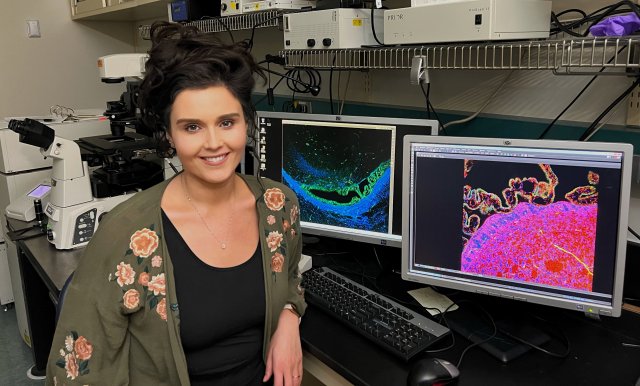Meet EPA Molecular Biologist Katie O’Shaughnessy, Ph.D.

Dr. Katie O’Shaughnessy studies how pollutants like PFAS can affect women’s and children’s health. Katie also serves as the lead for children’s health research in the Office of Research and Development (ORD).
What research are you working on right now?
I combine molecular biology and toxicology to understand how environmental chemicals may contribute to pregnancy complications, birth defects, and developmental disorders.
What is your education/ science background?
I have a bachelor’s degree in biology from Capital University in Ohio and a Ph.D. in genetics and genomics from The University of Florida. During my Ph.D. I studied the development of external genitalia. This may seem like an odd thesis topic, but a birth defect called hypospadias is one of the most commonly diagnosed birth defects in the United States, affecting around 1 in 200 boys. One of the ways hypospadias can happen is hormones (chemical messages) like androgens and estrogens don’t communicate to genes as they should during genitalia development. My thesis work focused on how androgens talk to genes and how estrogen receptors change over evolutionary time. I became a postdoctoral fellow at EPA in 2015, and a principal investigator last year.
When did you first know you wanted to be a scientist?
I always loved animals and nature and grew up riding horses. I also had numerous other pets including birds, hamsters, lizards, dogs, and fish. I never really thought about a research career until I was a junior in college. I wanted to become a veterinarian and was working very hard to achieve that goal. I did some research at my undergraduate institution for a few years to strengthen my resume, and then did a summer internship through the National Science Foundation in Biotechnology and Genomics at Iowa State. After my experience in Iowa, I was hooked on Genomics and decided to apply for Ph.D. programs instead of veterinary medicine.
What do you like most about your research?
It’s extremely rewarding to do work that contributes to the Agency’s mission. I also love the intellectual freedom. There’s nothing like the thrill of discovery!
How does your science matter?
Children are more susceptible to many environmental agents as compared to adults. Some people question whether exposure to certain toxic substances during pregnancy or infancy may contribute to neurodevelopmental disorders, but this link is not clear in the scientific literature. In my research I use sensitive tools and models to pick up on subtle changes that may happen in the brain after exposure to environmental toxicants. These changes may be more representative of human conditions like autism and would likely be missed when using a traditional toxicology approach. In all, my research bridges conventional toxicology and basic science to address how environmental pollutants may affect complex developmental disorders. These research findings can then be used in chemical risk assessment.
If you weren’t a scientist, what would you be doing?
I would be a graphic or interior designer. They’re hobbies now but would be a fun career.
What advice would you give a student interested in a career in science?
I often offer two pieces of advice. The first is that the scientific process is uncomfortable (at first). When we work in research it’s to push the knowledge boundary and answer questions where humanity may have little or no information. This can feel scary when all through high school and college you HAD to know the correct answer. It takes courage and self-confidence to say, “I don’t know”, and to admit when you/the field may be wrong. I took Philosophy courses during college as electives, and I encourage prospective scientists to do so too if possible. It helped shape my critical thinking skills and you experience openly debating concepts that do not necessarily have a straightforward answer. My second piece of advice are the words of Shirley Chisolm: “if they don't give you a seat at the table bring a folding chair”.
If you can have any superpower, what would you choose?
I love SCUBA diving, so I would probably choose to breathe underwater. This would also help fulfill my childhood dream to become a mermaid.
What do you think the coolest scientific discovery was and why?
CRISPR-Cas9 gene editing. It was discovered about 10 years ago and is a way to quickly “copy + paste” or “copy + delete” genes from the genome. It has already changed how we do laboratory science and there’s multiple clinical trials to treat people with deadly genetic diseases. I think in the next few decades many lives will be saved due to this technology.
If you could have dinner with any scientist, past or present, who would you choose and what would you talk about?
Leonardo DaVinci. One of my favorite parts of science is how visually beautiful it can be. DaVinci was an incredible inventor and anatomist - I wonder what he would say if he could look down a microscope and see a cell?
What do you think is our biggest scientific challenge in the next 20/50/100 years?
Climate change and sustainability.
